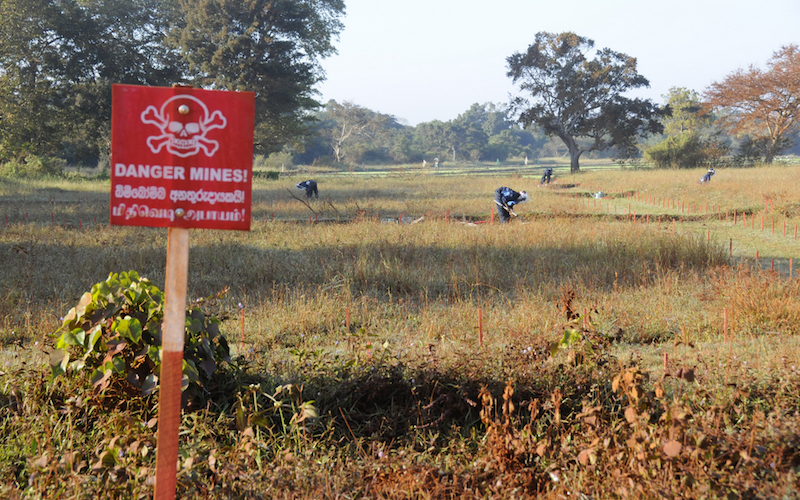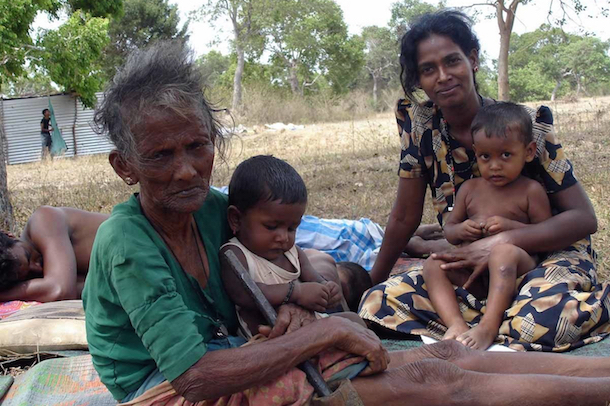I want to reemphasize that any type of political resolution should be based on the people’s will ascertained through a referendum.

Russell Watkins
by Taylor Dibbert, ‘International Policy Digest,’ USA, October 10, 2016
Mr. Visuvanathan Rudrakumaran is Prime Minister of the Transnational Government of Tamil Eelam (TGTE). He is based in New York City.
This interview has been edited for brevity and clarity.
Sri Lanka’s January 2015 presidential election resulted in Mahinda Rajapaksa’s ouster. Since Maithripala Sirisena assumed the presidency, has TGTE’s engagement with the Sri Lankan government changed? If so, how?
As we stated in our press release following the 2015 election, the TGTE did not think that Mr. Sirisena’s ascent to the position of president of Sri Lanka would bring any change to the Tamils. We believe that it is the Sinhala-Buddhist chauvinist state structure that has served so cruelly to maintain the Tamil national crisis which has remained unresolved for all these decades. The election produced only a face change as the very same chauvinist structure reasserts itself further.
Thus there is no change vis-à-vis the Tamils’ authentic political aspirations and, by extension, no change with respect to the relationship between the Sri Lankan government under Sirisena’s presidency and the TGTE.
Mahinda’s regime designated the TGTE and most of the other diaspora organizations and diaspora political activists as “terrorist organizations.” The Sirisena regime, while sanctifying several other diaspora organizations, has not removed the TGTE from the list, notwithstanding the fact that the TGTE’s constitution mandates the realization of our political goals through peaceful and democratic means.
What’s your assessment of the new government’s performance thus far?
With respect to the Sinhala polity, the new government has brought in some democratic features such as fighting corruption. However, with respect to the Tamils, the new government, in a calculated and sophisticated manner, is consolidating the military victory of the previous regime into a political victory.

Internally displaced Sri Lankans during the waning months of the civil war. (trokilinochchi/Flickr)
The 99% Sinhalese Sri Lanka Army continues to occupy over 67,000 acres of private Tamil land and state lands in traditionally Tamil areas. Seven years after the conclusion of the war, the Sri Lankan government continues to detain (without charge or trial) approximately 250 Tamil prisoners of war. Some detainees have been held for as long as 20 years without public acknowledgement that they are being held. There is no information about large scale surrenders ofLiberation Tigers of Tamil Eelam (LTTE) members, some of whom surrendered with their children. State-sponsored Sinhala settlements in Tamil-majority areas are a deliberate attempt to transform demographics and culture.
The new regime has injected an “illusory fawn” called “good governance” into the international dialogue on Sri Lanka. Due to this illusory good governance, foreign governments, some sections of civil society and the Tamil domestic leadership are going soft on the new regime. In addition, due to geopolitical interests, the big powers are also keen on protecting and stabilizing the new regime at the expense of Tamil interests and transitional justice.
In October of last year, Sri Lanka co-sponsored a resolution at the U.N. Human Rights Council (HRC) in Geneva. The resolution called for a bold transitional justice agenda. In your view, has Colombo done a good job of complying with the resolution?
Definitely not! Thus far there is an absence of genuine consultation with the victims of international crimes and continuing intimidation by security forces. Despite its commitment to repealing the Prevention of Terrorism Act (PTA) in HRC resolution 30/1, the government continues to regularly rely on the act in order to arbitrarily detain Tamils. It has not even enacted statutes criminalizing war crimes, crimes against humanity, and genocide and has repeatedly repudiated its commitment in resolution 30/1 to include international participation in transitional justice mechanisms.
How involved should international actors be in Sri Lanka’s transitional justice process?
As stated in the “Million Signature Campaign” launched by the TGTE last year, the Sri Lankan state is not ethnically neutral. The Sri Lankan judiciary is not ethnically neutral.
There is no political will in Sri Lanka to provide justice for Tamils. The (domestic 2010) Lessons Learnt and Reconciliation Commission (LLRC) has not delivered justice to Tamils. The change of guard in Sri Lanka will not result in a change in institutionalized impunity. President Sirisena’s potential culpability in war crimes will not be conducive for a domestic or hybrid judicial mechanism, and Sri Lanka does not have criminal provisions for war crimes, crimes against humanity, and genocide.
Turning to the Tamil political scene, how satisfied have you been with the performance of the principal Tamil political grouping, the Tamil National Alliance (TNA)?
There are genuine concerns being expressed in the Tamil polity about the performance of the TNA and the authenticity of their approach today. We understand that due to the 6th amendment [of Sri Lanka’s constitution] which violates the freedom conscience and freedom of speech guaranteed in Articles 18 and 19 of the International Covenant on Civil and Political Rights, the Tamil political leadership is not in a position to articulate the political aspirations of the Tamil people as articulated in the 1977 general elections, the last time elections were held in an open political space. The TNA have a duty to tell the international community about the Tamils’ political aspirations. There must be a politics based on truth.
What, if anything, could TNA do to improve its performance?
Our firm belief is that politics is all about power. Holding power alone is not enough. Power should be exercised and it should be demonstrated. The Tamil people built up their political power through a long and painful struggle in the Northeast homeland [the northern and eastern parts of the country]. This power should be retained, strategically used and not be wasted by their leaders. The recent Tamil uprising “Ezhuga Thamil” is a response to the power vacuum being created by the TNA. The TNA should recognize the power of the people and use that people’s power and that of the international community to move forward.
In terms of negotiating a political solution to the ethnic conflict, what role would you like to see international actors play?
If you look at the peace efforts around the world, the most common mechanism introduced and supported by the international community to resolve national questions has been the holding of a referendum. In the case of Kosovo, in spite of the parent state Serbia’s opposition, the international community decided that only through a referendum could national conflict be resolved. We expect for the UN or any state power which is keen to solve the national question in Sri Lanka to propose and support a referendum as the central feature in negotiating a political solution. The referendum proposed by us contains all options such as ‘unitary,’ ‘federal state,’ ‘unitary framework with federal features,’ and ‘independent state.’
More specifically, what sort of role would you like to see India play? What about the United States?
The Tamil people’s political future is intertwined with that of India. We want India to acknowledge us as a people and thus recognize our right to self-determination and our long struggle for it. The more immediate role for India, as a moral power, has to be in ensuring that justice is given to the Tamil people. In our recent signature campaign, more than 600,000 Tamil people from India participated in it. The leaders and bureaucrats of the Indian government should take into account the wishes of their own people calling for an international transitional justice process in Sri Lanka. We also want India to persuade the Sri Lankan government to repeal the 6th amendment and to provide an open political space for the Tamils to articulate their political aspirations.
With respect to the U.S., our request is not to drop the ball in order to gain temporary political benefits, but to participate in the process more genuinely. We want the U.S. to continue to play an effective role in ensuring that accountability is addressed, followed by a political resolution arrived at within an open political space.
Short of a separate Tamil state, is there a power-sharing arrangement that would satisfy you? If so, would you talk a little bit about what that might look like?
Due to the rigid ethnocratic nature of the Sri Lankan state, we believe only an independent state can provide dignity and security for the Tamils. For an interim period, the Interim Self Governing Authority [ISGA] previously proposed by the LTTE could be the basis for a power-sharing arrangement. The ISGA was received positively at the time by the U.S. and the EU, among others.
Under the proposed ISGA, human rights, secularism, the separation of powers, etc. will be guaranteed. It also provided for both the Sinhalese and the Muslims in the Northeast to be members of this body. The ISGA specifically emphasized that the Muslim community had the right to participate in the formulation of a role in ISGA.
However, I want to reemphasize that any type of political resolution should be based on the people’s will ascertained through a referendum.